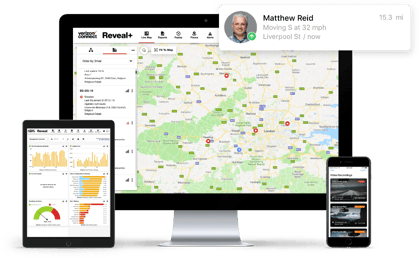9 Secrets to Reducing your Fleet Expenses
As a fleet owner, your day-to-day costs can quickly add up. What you don’t know is there are further hidden, expensive...
Read more
The impact of telematics systems on driver behaviour, fleet compliance and safety culture programmes are becoming more evident as usage expands globally. Telematics systems available in the UK today provide powerful tools for fleet managers and owners, giving deep insight into their workers and assets. With new devices and features being presented on the British market, adoption is likely to continue to increase. However, telematics systems provide the greatest benefit to fleet managers when they are implemented company-wide. Organisations that hire grey fleet drivers may encounter challenges with establishing company-wide policies surrounding telematics usage.
A grey fleet is used to describe when private vehicles that do not belong to the company are used for business purposes.
Grey fleet drivers are drivers who use private cars to conduct company business instead of a company vehicle. Employees using their own vehicles are less likely to have telematics technology installed and therefore pose a greater risk in fleet management.
Coming up with proper ways to manage grey fleet driving and telematics usage can be a challenge but having a company-wide policy can help. Some grey fleet drivers may not understand how telematics can improve not only efficiency, but their health and safety. So, let’s look at the benefits of establishing a telematics policy for grey fleet drivers in your organisation and some of the key features and tools to take advantage of.
One of the best ways to promote safety and reduce liability is by establishing standard fleet policies throughout your organisation for both grey fleet drivers and company cars. The policy should include, at a minimum, the following procedures:
1. Establish basic vehicle standards for your fleet. Every unit that operates under the umbrella of your fleet, whether an employee’s own car or company owned, should be required to fit within standard guidelines including: age of vehicle, certain safety features, CO2 emissions levels, up to date registration, and insurance.
2. Comply with Ministry of Transport (MOT) tests for vehicle safety and emissions - when a vehicle passes, it will be confirmed with the MOT certificate stating that your vehicle meets the acceptable safety and environmental standards required by UK law.
3. Perform licence checks to ensure every driver has a valid driving licence.
4. Require telematics installation on every vehicle. For company-owned units, this is a no brainer. For grey fleet drivers enforce the policy that you own the hardware, they own the vehicle. Requiring installation will send a strict message to your fleet - but some grey fleet drivers may not want to buy into your policy. You may need to sell the benefits of telematics and offer some incentives in order to get full adoption.
Find the right solution for your business with our free Fleet Management Buyer’s Guide.
Convincing grey fleet drivers to install telematics devices on their own cars may be a challenge. By clearly explaining the functionality, benefits, and overall purpose each device has, and by offering incentives based off of telematics use can help. Below we cover the key benefits of installing GPS vehicle tracking across all your fleet vehicles and the pros of each telematics devices.
The Health and Safety at Work Act of 1974 requires employers to protect the health and safety of all employees while at work - whether using company fleet cars or personal vehicles for business use. This means employers have the same legal duty of care for grey fleet drivers as for those employees in a work supplied vehicle. Employers, therefore, have a legal obligation to make sure any work-related journey is undertaken as safely as possible.
GPS vehicle tracking technologies can also help make the process of logging business mileage for road tax purposes easier with electronic logbook options available.
If employees' personal cars are being used for business journeys and those drivers are found to be non-compliant, your bottom line will be impacted by the costs of violations, downtime, or incidents that occur as a result. Complying with government mandates and regulations can be a cumbersome chore for your drivers and fleet managers alike. Using telematics systems, you can simplify the burden of compliance for all your drivers.
Pre-trip vehicle inspections are one of the most important factors in promoting the safety of CDL drivers and vehicles. A skipped or hastily performed CDL pre-trip inspection could lead to a catastrophic crash with injuries and fatalities, especially when it comes to HGV driving. Grey fleet drivers are no exception to the steadfast rule that inspections are essential to safety. Fleet managers can make grey fleet drivers lives easier by allowing them to use electronic DVIRs offered by telematics providers. Drivers can sign off on a full pre-trip inspection and include detailed photos of their work from a mobile phone or tablet using electronic DVIRs. This is one of the easiest benefits to sell because it makes drivers’ lives easier and protects grey fleet driver and vehicle safety, while also protecting carrier liability.
What if you could tell your drivers you could help them get to their destination faster and with less traffic? Sophisticated GPS tracking solutions are now on the market (and continuing to be improved upon) that make getting from point A to point B less hassle. GPS software takes unique factors into account to produce the best routes for your business, fast and accurately. This means drivers will be spending a lot less time manually tweaking the calculated routes. Providing every driver, including grey fleet drivers, GPS tracking units in their cars and vans helps them adapt to last-minute changes and helps everyone meet their targets for a better workday.
Managing grey fleet drivers can be a challenge but having a company-wide policy and using telematics technology can help. Establishing basic vehicle standards, developing strict policies for hiring, and requiring telematics installation on every vehicle improves fleet management at every level. Selling the benefits of vehicle tracking to your drivers can also improve adoption.
Contact Verizon Connect to learn more about our telematics solutions and how we can help you to transform your fleet today.
Tags: All



Find out how our platform gives you the visibility you need to get more done.
As a fleet owner, your day-to-day costs can quickly add up. What you don’t know is there are further hidden, expensive...
Read moreVerizon Connect Reveal tracks the fleet data that can have a big impact on your business. These are things like where...
Read moreAt Verizon Connect, we can only provide the highest possible level of service to fleet managers and business owners by...
Read moreReveal tracks the fleet data that can have a big impact on your business. These are things like where your vehicles are...
Read more